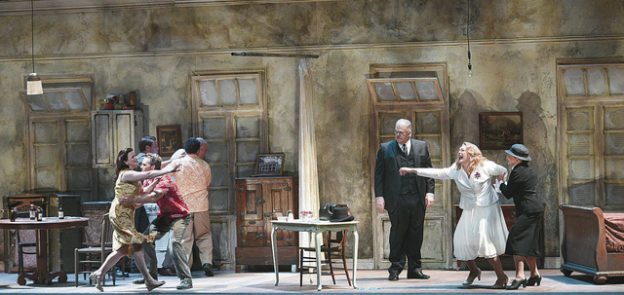
The Honolulu Star-Advertiser: ‘A Streetcar Named Desire’ features intense psychological drama
If there is ever an iconic moment in American theater, it’s in “A Streetcar Named Desire,” when Stanley Kowalski shouts “Stella!” at the top of his lungs, pleading forgiveness from his wife, whom he has just struck in a fit of drunken jealousy and anger over her sister, Blanche Dubois.
“I’ll tell people, ‘I’m doing ‘Streetcar Named Desire,’ and they won’t know it, but then I’ll go, ‘Stella!’ and they’ll know,” said Brad Dalton, who is directing this week’s Hawaii’s Opera Theatre production of the opera of Tennessee Williams’ Pulitzer Prize-winning drama.
Grammy-winning musician Andre Previn, known as a composer of film scores and for his work in modern American music, composed the jazzy score, with Philip Littell’s libretto drawing directly from Williams’ powerful story about Blanche, a faded Southern belle with a terrible secret (or two or three), and her emotional and physical takedown by the brutish Stanley.
The play, immortalized in a 1951 film starring Marlon Brando and Vivien Leigh, is one of many Williams dramas that deals with psychological problems, a reflection of his own life.
“This is Tennessee Williams pouring out his sympathy for those in life who feel misunderstood, who feel judged, who feel bewildered, the lost, the wanderers who cannot find their place,” Dalton said.
Dalton was assistant director in the original production of this opera when it was performed in San Francisco in 1998, and he has directed it many times since then. His presentation has the characters slipping in and out of the real world and an alternate consciousness. “There are moments of memories of traumas, where the colors and lights begin to move away from that realism and we go into more of a psychological space, and then it snaps back to reality,” he said. “It’s exciting that way, to see, ‘Oh, that character is a memory in her mind. It’s haunting her as a black silhouette.’”
DALTON THINKS “Streetcar,” more than most Williams plays, lends itself to operatic treatment. “When you read the script, it has a tremendously descriptive and very provocative sound landscape,” he said. “There’s supposed to be cats scratching and the sound of railroads going by, and jazz playing in the distance, and cackling crowds.”
Conductor Mark Morash said the opera has stood out among modern American operas in that it has been produced several times since its debut, including in major cities like Los Angeles and Chicago, and overseas in France and the U.K.
HOT’s production comes from New Orleans. “That it’s getting played at all says something,” Morash said.
Previn’s score presents a panoply of colorful sounds, Morash said, and like any great opera score, it’s a reflection of what’s happening onstage.
“When Stanley and Blanche are having what Blanche thinks is a casual exchange, Stanley is getting the dirt on Blanche,” he said. “It’s set it in this kind of jazzy music, which makes it feel it’s all easygoing. … Then there will be a little dissonance, and you realize that it’s Stanley at work, slowly but surely dismantling Blanche.”
Those who might have seen the original production — it’s out on DVD — might notice that the orchestral arrangement is different. With Previn’s blessing and assistance, the original orchestration was reduced and adapted for an ensemble of about 45 musicians.
Morash was involved in the project; he thinks it now sounds better.
“The big orchestra, which is probably close to 70 players, was such a behemoth; it was so bulky that you couldn’t get the intimacy of what was happening onstage,” he said. “I think this version feels a lot more like what’s happening onstage.”
The orchestra takes on a score that mixes genres and calls for unusual techniques from the woodwinds and strings, as well as precise rhythmic coordination in the jazzy sections.
“Let’s say there wasn’t much chatter during orchestra rehearsal,” Morash said with a laugh. “It’s complicated. There’s a lot of changing meters. It’s difficult music. There’s so many colors — flutter-tongue tremolandos (a “trembling” effect) in the flutes and harmonics in the strings that happen at different points. They’re doing great, and the orchestra, I think, was really excited about how visceral the music is.”
SOPRANO JILL GARDNER, who gave a pleasing performance here in “Tosca” in 2013, appears as Blanche, a coquettish yet desperate woman trying to keep things together during troubled times. Gardner, the older of two daughters who bore the burden of family responsibility when her parents died, said she identified with Blanche.
“I have a special affinity for her because she’s a Southern sister. She’s from Mississippi and I’m from North Carolina, but there’s a lot that I think I sympathize and empathize with, living within her skin as a Southern woman,” said Gardner in a drawl that seems made for Blanche’s famous line, “I have always depended on the kindness of strangers.”
Gardner said Southern women face particular challenges, having to maintain a “facade” at all times to create a favorable impression on those around them, while hiding their own pain.
“A Southern woman will always try to create beauty, and by doing that she’ll take care of everybody else,” she said, “but in taking care of everybody else, they keep themselves from feeling those little interior hurts. What Blanche has taught me is that everybody, no matter who they are, carries a little bit of suffering within them. It’s probably internal, which they might share with closest friends and family, but it’s something that they carry.”
Blanche has the two main arias in the opera, “I Want Magic” and “I Can Smell the Sea Air,” which Gardner particularly loves. “I think they really express the ‘essential oil’ of this character — her desire for love, for magic, for everything to be good and happy and beautiful for everyone.”
And that primal scream from Stanley? That moment belongs to baritone Ryan McKinny, returning to HOT after his bravura debut here in “The Flying Dutchman” in 2015.
Though we all think we can scream (but few think we can sing opera), McKinny said it’s not easy.
“With singing, your air and your vocal folds are coordinated and they’re balanced,” he said. “When you’re screaming you’re using your body to squeeze your lungs, so there’s a ton of air pressure going across your cords. You aren’t putting them together in a balanced way; you’re just making an emotional sound. But just like the way you might do an ornament or find a color for singing, you can do that when you’re screaming onstage.”
He sees Stanley as not the simple villain, though he does “have a temper problem.”
“He’s sort of all about being practical and earthy and honest and simple,” he said. “He always has some sort of human motivation for the things that happen. From Stanley’s perspective, this woman comes in and just doesn’t leave.”
By Steven Mark for The Honolulu Star-Advertiser
